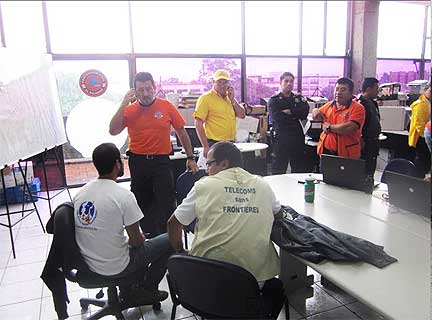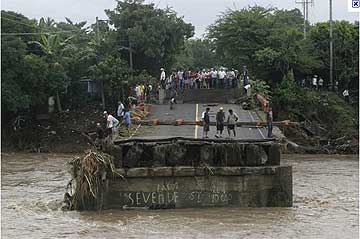
In the Ahuachapán department, TSF carries out a telecom assessment in collaboration with the Civil Protection and the departmental Government. TSF in the offices of the Civil Protection (El Salvador)
Intense rain brought out a TSF team who immediately coordinated with the United Nations Office for the Coordination of Humanitarian Affairs (OCHA), the European Commission’s Humanitarian Aid department (ECHO) and the local Civil Protection to assess the needs for emergency telecommunications on the ground. Guatemala has reported 38 deaths; El Salvador, 34; Honduras, 15; Nicaragua 13 and Costa Rica, 5.
Hardest hit was El Salvador, where authorities said more rain fell in the last eight days than during the devastating 1998 Hurricane Mitch. The Lempa River washed over its banks and flooded more than 18,000 homes.

Central America has been stricken by torrential rains since last week after the succession of five hurricanes and tropical storms. El Salvador declared the state of emergency with more than 30 people killed by floods and mudslides. The government ordered the evacuation of the hardest hit areas. As a result, 45,000 people have taken refuge in 558 shelters across the country. The Government of El Salvador said the priority is to meet the needs of these displaced populations.

The floods in El Salvador kiled at least 130 people and left about 7,000 living in shelters, Here residents stand on a bridge that colapsed due to heavy rain. BBC Mobile
In the Ahuachapán department, TSF carries out a telecom assessment in collaboration with the Civil Protection and the departmental Government. You will find attached a photo illustrating TSF in the offices of the Civil Protection (El Salvador).
Nicaragua has also declared a state of emergency with 25,000 people affected by the floods. TSF coordinated with the United Nations Disaster Assessment and Coordination teams (UNDAC) on the ground and remains ready to deploy from its regional base in Managua.
Rains are expected to continue in Central America due to the normal rain season; thus the water level is still increasing.

